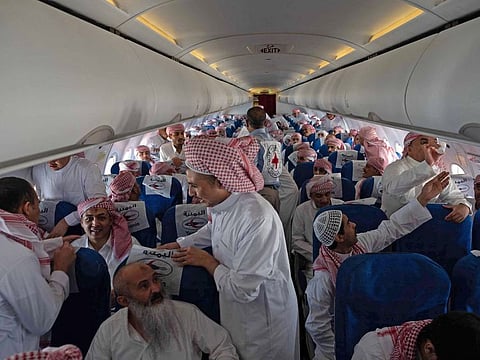16 Saudis and 3 Sudanese among scores freed on day 2 of prisoner swap
Flights connecting Saudi Arabia, Sanaa part of multi-day transfer of nearly 900 detainees

ABHA, Saudi Arabia: Hundreds of prisoners of war, including Saudis, were freed Saturday as part of a cross-border exchange between a Saudi-led military coalition and Yemen’s Iran-backed Houthi rebels, the International Committee of the Red Cross said.
The flights connecting Saudi Arabia and Houthi-held territory in Yemen were part of a multi-day transfer involving nearly 900 detainees, and came amid peace talks which have raised hopes for an end to Yemen’s eight-year-old war.
Saturday’s first flight left the southern Saudi city of Abha for Yemen’s Houthi-held capital Sanaa with 120 Houthi rebel prisoners, ICRC public affairs and media adviser Jessica Moussan said.
It was followed by a flight from Sanaa to Riyadh carrying 20 former detainees, among them 16 Saudis and three Sudanese, according to the state-affiliated Al Ekhbariya channel.
Sudan is part of the Saudi-led coalition and has provided ground troops for the fighting.
The Sanaa-Riyadh flight also included a brother and son of Tareq Saleh, a member of Yemen’s Presidential Leadership Council and nephew of ex-president Ali Abdullah Saleh.
Other flights Saturday included a second Abha-Sanaa leg with 117 Houthis on board, and three more carrying a combined 100 Houthis to Sanaa from the government-held Yemeni town of Mokha.
On Friday, 318 prisoners were transported between government-controlled Aden and Sanaa, reuniting with their families ahead of next week’s Muslim holiday of Eid al-Fitr.
The total number of prisoners of war on both sides is unknown.
Coalition spokesman Turki Al Maliki said the goal was to “get back all prisoners and detainees”.
The ongoing exchange is a confidence-building measure coinciding with an intense diplomatic push to end Yemen’s war, which has left hundreds of thousands dead from the fighting and knock-on effects like hunger and a lack of access to health care.
“We hope it’s one step in a larger journey that will eventually lead to peace,” said Mamadou Sow, ICRC’s head for the Gulf Cooperation Council.
Path to peace?
The Saudi war exit strategy appears to have taken new impetus from a landmark rapprochement deal announced with Iran last month.
The China-brokered agreement calls for the Middle East countries to fully restore diplomatic ties following a seven-year rupture, and has the potential to remake regional ties.
Saudi Arabia is also pushing for the reintegration into the Arab League of Iran ally Syria, more than a decade after its suspension over President Bashar Al Assad’s crackdown on pro-democracy protests.
On Friday, the kingdom, which once openly championed Assad’s ouster, hosted top diplomats from eight other Arab countries in the Red Sea city of Jeddah for talks on Syria, then issued a statement highlighting the “importance of having an Arab leadership role in efforts to end the crisis”.
In Yemen, active combat has reduced over the past year following a UN-brokered truce that officially lapsed in October but has largely held.
A week ago, a Saudi delegation travelled to Sanaa, held by the Houthis since 2014, for talks aimed at reviving the truce and laying the groundwork for a more durable ceasefire.
The delegation, led by ambassador Mohammad Al Jaber, left Sanaa late on Thursday without a finalised truce but with plans for more talks, according to Huthi and Yemeni government sources.
Sign up for the Daily Briefing
Get the latest news and updates straight to your inbox



